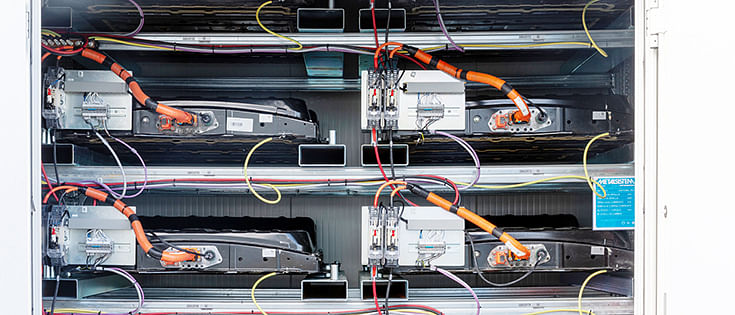Nissan Leaf batteries start second life at Italy’s largest airport
Eighty-four Nissan Leaf batteries, reconditioned and used to supply 2.1 MWh of energy storage to Enel’s large-scale pioneering system, have been sourced from high-mileage vehicles and requalified to meet strict safety and performance standards. Nissan predicts the second-life batteries will remain operational for more than 6-7 years at the Fiumicino airport, even when used daily.
Nissan has supplied 84 second-life Nissan Leaf EV batteries – totalling 2.1 MWh of energy storage – to system integrator Loccioni, which is responsible for harmonizing them into Enel’s Energy Storage System.
Pioneer is coupled with a solar farm of 55,000 solar panels due to generate 31 GWh of renewable energy per year to provide reliable, clean power to the airport terminals, as well as flexible services to the airport grid.
The reused Gen 3 30kWh and Gen 4 40kWh Leaf batteries, sourced from high-mileage vehicles and warranty returns, have been carefully requalified to meet strict safety and performance standards. Nissan predicts the second-life batteries will remain operational for more than 6-7 years at the airport, even when used daily.

84 reconditioned Nissan Leaf batteries have been used to supply 2.1 MWh of energy storage to Enel’s large-scale pioneering system.
Soufiane El Khomri, Nissan Energy Director for the company’s Africa, Middle East, India, Europe and Oceania region (AMIEO), said: “This project not only demonstrates the long-term viability of repurposed EV batteries in demanding environments, but underscores Nissan’s commitment to sustainable end-of-life battery management.
“Our team is involved in the technical integration of second-life batteries into the ESS, the simulation of battery lifespan, and providing warranties for their performance in the new system. Just as importantly, once the batteries reach the end of their useful life on this project, we take full responsibility for their recycling.”
Nissan has a history of successful collaborations with Loccioni and energy provider, Enel. Similar energy storage projects such as the Melilla ESS in Spain and the Nomadic LabAlliance Internal ESS system have proved the effectiveness and reliability of Nissan's second-life battery technology in providing stable, renewable energy solutions.
El Khomri added, “We are turning potential waste into valuable energy assets. Our re-use strategy not only supports large-scale industrial projects such as Aeorporti di Roma’s Fiumicino Airport, but also shows potential for use in the home such as backup during power cuts.
“As we continue to scale battery reuse and recycling, we are advancing our broader mission toward a cleaner, more energy-efficient future.”
RELATED ARTICLES
Autoliv Plans JV for Advanced Safety Electronics With China’s HSAE
The new joint venture, which is to be located strategically near Shanghai and close to several existing Autoliv sites in...
JLR to Restart Production Over a Month After September Hacking
Manufacturing operations at the Tata Group-owned British luxury car and SUV manufacturer were shut down following a cybe...
BYD UK Sales Jump 880% in September to 11,271 units
Sales record sets the UK apart as the largest international market for BYD outside of China for the first time. The Seal...






 04 Jun 2025
04 Jun 2025
 4689 Views
4689 Views










 Ajit Dalvi
Ajit Dalvi




